November 4, 2015 •
Jennifer Jaketic Joins State and Federal Communications, Inc.
State and Federal Communications, Inc. announces Jennifer Jaketic as a new compliance assistant. She assists in the company’s Corporate Contribution Compliance department, also known as C3, which monitors the rules associated with corporations making political contributions. “I like obliging by […]
 State and Federal Communications, Inc. announces Jennifer Jaketic as a new compliance assistant.
State and Federal Communications, Inc. announces Jennifer Jaketic as a new compliance assistant.
She assists in the company’s Corporate Contribution Compliance department, also known as C3, which monitors the rules associated with corporations making political contributions.
“I like obliging by the rules and the ethical considerations of campaign finance,” Jaketic added. ”I enjoy working with numbers and the compliance aspect of it, which is why my position at State and Federal is such a valuable experience.”
“We started vetting contributions for our clients in 2008 and it is a piece of business which has grown. Nola Werren, Esq. from our staff has the experience needed with Jennifer to keep the work in progress for our clients,” said President and CEO Elizabeth Bartz.
Jaketic has more than 12 years of experience in campaign finance. Immediately following graduation from George Washington University with a bachelor’s in political science, Jaketic worked for the Federal Election Commission in its Reports and Analysis division, where she reviewed campaign finance reports of Political Action Committees. Jaketic is currently pursuing a master’s degree in accounting at Cleveland State University.
October 22, 2015 •
Thursday News Roundup
Lobbying “K Street Eyes Late-Year Rebound” by Megan Wilson for The Hill Campaign Finance “Divided D.C. Council Takes Aim at Mayor Bowser’s Super PAC” by Aaron Davis for Washington Post Missouri: “Ten Missouri Megadonors Drive Largest Political Contributions” by Jason […]
Lobbying

“K Street Eyes Late-Year Rebound” by Megan Wilson for The Hill
Campaign Finance
“Divided D.C. Council Takes Aim at Mayor Bowser’s Super PAC” by Aaron Davis for Washington Post
Missouri: “Ten Missouri Megadonors Drive Largest Political Contributions” by Jason Hancock for Kansas City Star
Ethics
California: “Does Orange County Need an Ethics Commission? Voters to Decide in June” by Meghann Cuniff for Orange County Register
“Report Traces Jeb Bush’s Ties to Companies That Had Business with Florida” by Matt Flegenheimer and Steve Eder for New York Times
Wisconsin “Lawmakers Approve Bill Ending John Doe Probes of Political Crimes” by Patrick Marley and Jason Stein for Milwaukee Journal Sentinel
Elections
“Biden’s Decision Boosts Clinton and Sets Up a Two-Way Race With Sanders” by Paul Kane and Karen Tumulty for Washington Post
Legislative Issues
“Paul Ryan Tells House Republicans He’s Willing to Run, If Conditions Are Met” by Mike DeBonis and Robert Costa for Washington Post
Q. I recently became a registered lobbyist in my company’s home state. I am also very active politically. Are there any restrictions on my political contributions now that I am a registered lobbyist? A. An individual’s status as a registered […]
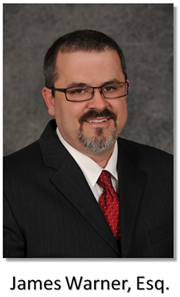 Q. I recently became a registered lobbyist in my company’s home state. I am also very active politically. Are there any restrictions on my political contributions now that I am a registered lobbyist?
Q. I recently became a registered lobbyist in my company’s home state. I am also very active politically. Are there any restrictions on my political contributions now that I am a registered lobbyist?
A. An individual’s status as a registered lobbyist can place additional restrictions and requirements on him or her related to his or her political contributions. Some jurisdictions place strict restrictions on a lobbyist’s ability to make contributions. South Carolina prohibits registered lobbyists from making contributions to a candidate or anyone acting on behalf of a candidate if the lobbyist engages in lobbying the public office or public body for which the candidate is seeking election. California has a similar prohibition, providing lobbyists may not contribute to a state candidate or officeholder, or their controlled committees, if registered to lobby the governmental agency for which the candidate seeks election or to which the officeholder belongs. Other jurisdictions limit the amount a registered lobbyist can contribute compared to a nonregistered individual. Registered legislative and executive agents in Massachusetts may contribute no more than $200 in the aggregate to any one candidate and such candidate’s committee during a calendar year.
A number of jurisdictions require reporting of lobbyist contributions. Pennsylvania has extensive registration and reporting requirements for lobbyists who make personal political contributions, requiring them to register with the state before making a personal contribution and to file reports on the same schedule as a PAC. Maryland’s reporting requirements are not as extensive, requiring certain political contributions to be disclosed on the lobbyist’s activity report.
When an individual becomes a registered lobbyist, he or she must review the applicable rules on his or her political contributions. If unsure as to the requirements, please be sure to review our website at www.stateandfed.com for up-to-date information.
You can directly submit questions for this feature, and we will select those most appropriate and answer them here. Send your questions to: experts@stateandfed.com.
(We are always available to answer questions from clients that are specific to your needs, and we encourage you to continue to call or e-mail us with questions about your particular company or organization. As always, we will confidentially and directly provide answers or information you need.) Our replies to your questions are not legal advice. Instead, these replies represent our analysis of laws, rules, and regulations.
Gov. Peter Shumlin has signed Senate Bill 93, changing lobbyist reporting requirements. Reports must now be filed for each month the legislature is in session with an additional report in September. The new law also requires identification of lobbyists contributing […]
 Gov. Peter Shumlin has signed Senate Bill 93, changing lobbyist reporting requirements. Reports must now be filed for each month the legislature is in session with an additional report in September.
Gov. Peter Shumlin has signed Senate Bill 93, changing lobbyist reporting requirements. Reports must now be filed for each month the legislature is in session with an additional report in September.
The new law also requires identification of lobbyists contributing to advertisements meant to influence legislation and a report must be filed within 48 hours if such advertisement cost $1,000 or more. Furthermore, a legislator’s candidate committee and a legislative leadership committee may no longer solicit or accept a contribution while the legislature is in session.
These provision are effective July 1, 2015.
February 26, 2015 •
Lawsuit Challenges MA Law Banning Corporate Contributions
On February 24, a lawsuit was filed in Suffolk County Superior Court challenging Massachusetts laws allowing unions to make political contributions while barring corporations from doing the same. The lawsuit is being brought by the Scharf-Norton Center for Constitutional Litigation […]
 On February 24, a lawsuit was filed in Suffolk County Superior Court challenging Massachusetts laws allowing unions to make political contributions while barring corporations from doing the same.
On February 24, a lawsuit was filed in Suffolk County Superior Court challenging Massachusetts laws allowing unions to make political contributions while barring corporations from doing the same.
The lawsuit is being brought by the Scharf-Norton Center for Constitutional Litigation at the Goldwater Institute on behalf of two state business corporations against Michael Sullivan, the director of the Office of Campaign and Political Finance (OCPF), which enforces the law.
In 1A AUTO, INC. v Sullivan, the plaintiffs alleges, “There is no legitimate justification for allowing unions to contribute thousands of dollars to candidates, parties, and political committees, while completely banning any contributions from businesses.” The plaintiffs argue the law violates “equal protection, free speech, and free association protected by the Massachusetts and United States constitutions” and are seeking a permanent injunction preventing the OCPF from enforcing the law banning corporate contributions.
February 11, 2015 •
Oregon Senate Bill Proposes Political Contribution Limits
Prompted by Secretary of State Kate Brown, a bill in the Oregon Senate would impose campaign contribution limits in a state where contributions are currently unlimited. Senate Bill 75, now in committee, sets the individual and entity contribution limit at […]
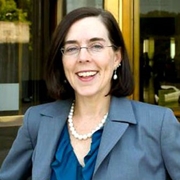 Prompted by Secretary of State Kate Brown, a bill in the Oregon Senate would impose campaign contribution limits in a state where contributions are currently unlimited.
Prompted by Secretary of State Kate Brown, a bill in the Oregon Senate would impose campaign contribution limits in a state where contributions are currently unlimited.
Senate Bill 75, now in committee, sets the individual and entity contribution limit at $2,600 per calendar year and the political committee limit at $5,000 per calendar year. These limits are aggregate limits, so total yearly contributions to any state, county, or city candidate or committee cannot exceed the stated limit.
The bill is an amendment to the state constitution, so it would have to be approved by voters before becoming law.
Photo of Oregon Secretary of State Kate Brown by Josh.Goldberg on Wikimedia Commons.
February 3, 2015 •
FEC Adjusts Federal Contribution Limits for the 2015-2016 Election Cycle
The Federal Election Commission (FEC) has published the 2015-2016 election cycle contribution limits, which have been indexed for inflation. As required by the Bipartisan Campaign Reform Act of 2002, the FEC must adjust certain contribution limits every two years. The […]
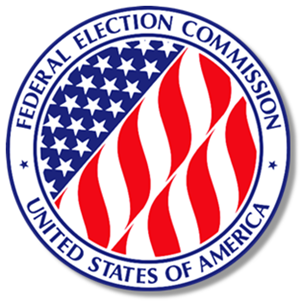 The Federal Election Commission (FEC) has published the 2015-2016 election cycle contribution limits, which have been indexed for inflation. As required by the Bipartisan Campaign Reform Act of 2002, the FEC must adjust certain contribution limits every two years.
The Federal Election Commission (FEC) has published the 2015-2016 election cycle contribution limits, which have been indexed for inflation. As required by the Bipartisan Campaign Reform Act of 2002, the FEC must adjust certain contribution limits every two years.
The individual and nonmulticandidate PAC contribution limit to federal candidates has increased from $2,600 to $2,700 for both primary and general elections, allowing for a total of $5,400 for a federal candidate.
The limits on contributions by individuals to national party committees has increased from $32,400 to $33,400 per calendar year. Individuals may now contribute $100,200 per calendar year to committees of a national political party for presidential nominating conventions, to committees of a national political party for preparation for and the conduct of election recounts and contests and other legal proceedings, and to committees of a national political party for the construction, purchase, renovation, operation, and furnishing of one or more buildings for party headquarters.
February 2, 2015 •
Ask the Experts – Indexing of Contribution Limits
Q. With the start of the New Year, are there any changes I should be aware of in political contribution limits? A. Aside from changes as a result of new legislation, the most common adjustment of contribution limits is indexing […]

Q. With the start of the New Year, are there any changes I should be aware of in political contribution limits?
A. Aside from changes as a result of new legislation, the most common adjustment of contribution limits is indexing for inflation. Typically, adjustments are made biennially for inflation according to the Consumer Price Index. The Consumer Price Index is calculated by the United States Department of Labor, Bureau of Labor Statistics.
This concept was addressed by the United States Supreme Court in Buckley v. Valeo (1976). The court allowed federal contribution limits to be adjusted upwards at the beginning of each calendar year by the average percentage rise in the Consumer Price Index for the 12 preceding months.
The principal behind this is quite simple: it is based on the recognition that the cost of campaigning steadily increases each year based on the increase to cost of living. Campaign fliers, mailers, yard signs, and media buys do not cost the same in 2013 as they do in 2015.
This year, California adjusted its contribution limits for the 2015-2016 biennium. In doing so, corporate contributions limits for general assembly candidates increased from $4,100 per election to $4,200. Washington adjusts its limits in even-numbered years, so the 2014 corporate contribution limit of $950 per election for state legislative candidates will remain the same for 2015. Illinois adjusts its limits in odd-numbered years, so the 2014 corporate contribution limit of $10,500 per election cycle for legislative candidates will increase to $10,800.
Finally, the indexing of contribution limits usually results from amendments to a state’s administrative code as opposed to its statute. In order to ensure compliance, a contributor should review both of these sources.
You can directly submit questions for this feature, and we will select those most appropriate and answer them here. Send your questions to: experts@stateandfed.com.
(We are always available to answer questions from clients that are specific to your needs, and we encourage you to continue to call or e-mail us with questions about your particular company or organization. As always, we will confidentially and directly provide answers or information you need.) Our replies to your questions are not legal advice. Instead, these replies represent our analysis of laws, rules, and regulations.
January 27, 2015 •
Maine Contribution Limits for Gubernatorial, Municipal Candidates Increased
The contribution limit for Maine gubernatorial candidates has been increased by $75, from $1,500 to $1,575 per election. The contribution limit for county and municipal offices has been increased by $25, from $750 to $775 per election. The contribution limit […]
 The contribution limit for Maine gubernatorial candidates has been increased by $75, from $1,500 to $1,575 per election.
The contribution limit for Maine gubernatorial candidates has been increased by $75, from $1,500 to $1,575 per election.
The contribution limit for county and municipal offices has been increased by $25, from $750 to $775 per election.
The contribution limit for state legislative candidates remains unchanged at $375 per election.
The foregoing adjustments were effective for any election held on or after January 23, 2015.
January 21, 2015 •
Long Beach, California Council Votes to Increase Officeholder Account Limits
City Council has cast the first of two required votes to increase contribution limits for officeholder accounts. Ordinance 15-0062 triples total permissible contributions per calendar year to city officeholder accounts to $30,000 for council members and to $75,000 for citywide […]
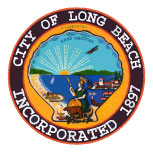 City Council has cast the first of two required votes to increase contribution limits for officeholder accounts. Ordinance 15-0062 triples total permissible contributions per calendar year to city officeholder accounts to $30,000 for council members and to $75,000 for citywide elected officials.
City Council has cast the first of two required votes to increase contribution limits for officeholder accounts. Ordinance 15-0062 triples total permissible contributions per calendar year to city officeholder accounts to $30,000 for council members and to $75,000 for citywide elected officials.
Individual contributor limits per calendar year will also rise from $500 to $750 for council officeholder accounts and from $500 to $1,000 for citywide officeholder accounts.
The second required vote could take place as early as the next regularly scheduled meeting on February 3, 2015.
January 12, 2015 •
Houston Ordinance Curtailing Political Contributions Preliminarily Blocked
On January 9, 2015, a federal court issued a preliminary injunction enjoining the city of Houston from enforcing its ordinance prohibiting political contributions until the first day of February prior to the day of an election. In Gordon v. City […]
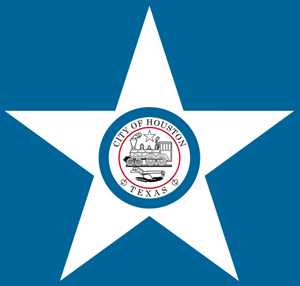 On January 9, 2015, a federal court issued a preliminary injunction enjoining the city of Houston from enforcing its ordinance prohibiting political contributions until the first day of February prior to the day of an election.
On January 9, 2015, a federal court issued a preliminary injunction enjoining the city of Houston from enforcing its ordinance prohibiting political contributions until the first day of February prior to the day of an election.
In Gordon v. City of Houston, the United States District Court for The Southern District of Texas, Houston Division, found the city did not present any evidence showing the ordinance advanced the city’s interest of preventing the appearance of corruption. The plaintiff argued the ordinance “stifles core political activity and prevents candidates from raising funds to run effective campaigns, yet it does not further the only legitimate governmental interest relevant in this area, i.e., the prevention of corruption or its appearance.”
Because this is a preliminary injunction, the court found the public interest would not be “disserved” by its issuance, concluding, “Any harm caused to defendants by issuing the injunction does not outweigh the more serious harm that will be suffered by Gordon if the challenged ordinance is enforced against him.”
December 15, 2014 •
Federal Omnibus Bill Allows Increased Political Contributions to Political Parties
With the Senate passing the House’s omnibus bill, the limits for political contributions to federal political parties will increase when President Barack Obama signs the bill. Included as a rider with House Resolution 83 is an amendment to the Federal […]
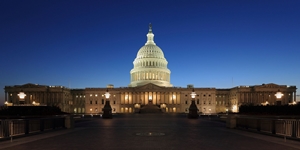 With the Senate passing the House’s omnibus bill, the limits for political contributions to federal political parties will increase when President Barack Obama signs the bill. Included as a rider with House Resolution 83 is an amendment to the Federal Election Campaign Act of 1971 allowing additional contributions to political parties for presidential nominating conventions, for preparation for and the conduct of election recounts and contests and other legal proceedings, and for the construction, purchase, renovation, operation, and furnishing of one or more buildings for party headquarters.
With the Senate passing the House’s omnibus bill, the limits for political contributions to federal political parties will increase when President Barack Obama signs the bill. Included as a rider with House Resolution 83 is an amendment to the Federal Election Campaign Act of 1971 allowing additional contributions to political parties for presidential nominating conventions, for preparation for and the conduct of election recounts and contests and other legal proceedings, and for the construction, purchase, renovation, operation, and furnishing of one or more buildings for party headquarters.
An additional provision of the bill prohibits the federal government from recommending or requiring any entity submitting an offer for a federal contract to disclose, as a condition of submitting an offer, any political contribution, expenditure, independent expenditure, or disbursement for an electioneering communication by the offeror, its officers or directors, or any of its affiliates or subsidiaries.
Another provision included in the bill prohibits the federal government from paying for a portrait of an officer or employee of the federal government, including the president, the vice president, a member of Congress (including a delegate or a resident commissioner to Congress), the head of an executive branch agency, or the head of an office of the legislative branch.
The president has said he will sign the bill.
UDPATE: On December 16, President Obama signed the House Resolution 83 into law.
Photo of the U.S. Capitol by Martin Falbisoner on Wikimedia Commons.
September 30, 2014 •
Appeals Court Hears Arguments Challenging Ban on Federal Contractors’ Political Contributions
Today, the U.S. District Court of Appeals for the District of Columbia will sit en banc to hear oral arguments challenging the constitutionality of barring contractors from contributing to candidates, parties, and their committees. On November 2, 2012, in Wagner […]
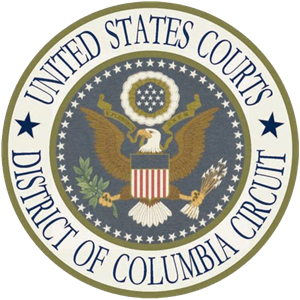 Today, the U.S. District Court of Appeals for the District of Columbia will sit en banc to hear oral arguments challenging the constitutionality of barring contractors from contributing to candidates, parties, and their committees.
Today, the U.S. District Court of Appeals for the District of Columbia will sit en banc to hear oral arguments challenging the constitutionality of barring contractors from contributing to candidates, parties, and their committees.
On November 2, 2012, in Wagner v. Federal Election Committee, a District Court rejected challenges to the constitutionality of section 441c of Title 2 of the U.S. Code, which prohibits any vendors with contracts with the federal government from making political contributions to federal candidates or political parties. The case, initially brought by the ACLU, asked the court to declare the law unconstitutional as applied to individuals who have personal services contracts with federal agencies.
Because federal workers who are not contractors may make federal political contributions, while contractors performing the same work may not, the suit argued section 441c violates both the Equal Protection Clause of the Constitution and the First Amendment. The court found no First Amendment or Equal-Protection violations, noting “the dissimilar roles of contractors and employees, moreover, justify the distinct regulatory schemes that the Government has fashioned.”
July 25, 2014 •
Howard County, Maryland Campaign Receives Charity Waiver
Maryland State Flag County Executive Ken Ulman gave to charity the $34,000 in campaign contributions he received from insurance executive Jeffrey B. Cohen, who was indicted last month on federal fraud charges. Cohen has been accused of misrepresenting the amount […]
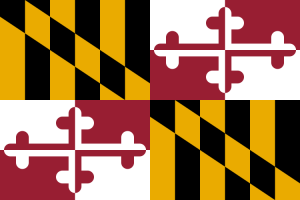 Maryland State Flag
Maryland State Flag
County Executive Ken Ulman gave to charity the $34,000 in campaign contributions he received from insurance executive Jeffrey B. Cohen, who was indicted last month on federal fraud charges. Cohen has been accused of misrepresenting the amount of cash his company had available to provide liability insurance to thousands of bars, restaurants, and strip clubs.
Although current Maryland election law requires political contributions to be used only for campaigns, the state Board of Elections issued a waiver. Ulman, who is Democrat Anthony Brown’s running mate for governor, donated Cohen’s contributions to the Maryland Crime Victims Network and the United Way of Central Maryland.
State and Federal Communications, Inc. provides research and consulting services for government relations professionals on lobbying laws, procurement lobbying laws, political contribution laws in the United States and Canada. Learn more by visiting stateandfed.com.


